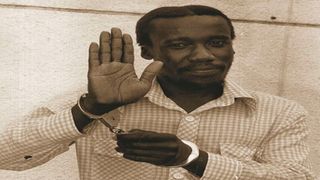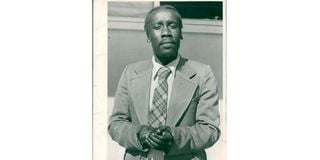
Senior Private Hezekiah Ochuka who was the ringleader of the attempted coup of 1982.
News
Premium
Sons of Nyakach pay for coup attempts
What you need to know:
- Two of Nyakach’s sons, Fredrick Collins Omondi Oyoo and Hezekiah Ochuka, were on the government’s cross hairs over attempted coups.
- For many years there seemed to have been an unofficial policy after 1982 not to recruit from Nyakach.
The fact that two men involved in attempted coups in 1971 and 1982 came from neighbouring villages in Nyakach, Kisumu County, brought far-reaching consequences to the area, with soldiers from there going for long without promotion while others were targeted by the State.
Two of Nyakach’s sons, Fredrick Collins Omondi Oyoo and Hezekiah Ochuka, were on the government’s cross hairs over attempted coups. Omondi co-led the April 1971 attempted coup against first President Jomo Kenyatta while Ochuka led the August 1982 attempted coup against President Daniel arap Moi. They come from neighbouring villages.
They both fled to Tanzania after their failed coup attempts but were repatriated to Kenya where they were prosecuted and sentenced.
Omondi was an Israeli and British-trained fighter pilot — one of the best trainees in Kenya. Alongside five other young elite Air Force military men, they had been taken to Israel and later Britain to be trained as jet fighter pilots in 1966.
On their return, Omondi, who had reportedly emerged best among his Kenyan colleagues, expected to be appointed to a senior rank within the Air Force but instead President Kenyatta picked Major-General Dedan Gichuru as the Air Force boss.
This is reported to have irked Omondi, who secretly started a coup plot.

Senior Private Hezekiah Ochuka who was the ringleader of the attempted coup of 1982.
Following the failure of the 1971 coup, Omondi sneaked into Tanzania by car but was sent back to Kenya where he was jailed for 10 years. He later died in his 70s after retreating to a quiet life.
As an Air Force officer, Omondi was an inspiration to many in Nyakach and would occasionally fly past his village during training.
It is no wonder that Nyakach-born Ochuka would later join the Kenya Air Force.
It is either by coincidence or design that on August 1, 1982, Ochuka, a charismatic and eloquent Senior Private, wooed his colleagues, some much senior than him in rank, into joining him in finishing what his village mate had failed to accomplish.
Following the botched 1982 coup, Ochuka was executed aged 28. Another of Nyakach’s great sons, Didacus Olak Diego, then serving as the Air Traffic Control boss was jailed 10 years for allegedly being involved in the coup as did James Odhiambo Apiny.
Because of the region’s reputation, a number of soldiers from there suffered ramifications and there seemed to have been an unofficial policy after 1982 not to recruit from Nyakach.
Dreadful experience
This week, when we caught up with Charles Oliech, 71, at his home in Obingo village in Nyakach, he recounted the painful experiences that followed the botched coup.
Just a few hours after the ill-fated day, the then Warrant Officer in the Kenya Air Force was subjected to the most-demeaning and dreadful experience of his life.
“I was ambushed, disarmed and brutally frog marched on the bare surface before we were locked in an aircraft apron at Nanyuki Air Base where I was stationed,” he told the Sunday Nation.
With no food the whole day, Mr Oliech and others were huddled and rained on the whole night.
“This marked the beginning of the worst moments in my life,” said the man who joined the military as an education specialist in 1978.
The next morning, they were separated according to their ranks before their fingerprints were taken and ferried to Nanyuki Prison where he spent 15 days in harsh and inhumane conditions.
“One morning, we were bundled into a lorry and ordered to sleep on the floor before having a bumpy ride to Eastleigh Air Base where we were temporarily kept inside the air force guardroom,” he recalled.

Charles Oliech, a 1982 coup attempt victim at his home in Nyakach Agoro on August 31, 2021. Court ordered he be paid Sh6 million but the government is yet to honour the order.
Mr Oliech would later shuffle between Kamiti Maximum Prison, Nanyuki and Naivasha prisons where he was subjected to a range of cruel, degrading and dehumanising treatments as a way of compelling him to write his statement.
“One day, I was escorted by a contingent of security officers to Naivasha Maximum Prison where I was stripped naked and thrown into a waterlogged cell all alone.
“For four days, I was not given food to eat or water to drink and had to answer the call of nature and drink the same water,” said the ex-soldier.
After enduring enough suffering, he agreed to have a date with the most terrifying man who was regarded as one the cruellest executor of torture orders at Nyayo House torture chambers in Nairobi.
Referred to as “torture-in-chief”, the burly James Opiyo who headed a unit within the Nairobi Provincial Intelligence Services, which fell under the dreaded Special Branch, did exactly what he was known for.
Presidential clemency
As one of the conditions to secure his release, Mr Oliech later accepted to testify against one Lieutenant Samson Oburu who hailed from his rural home of Agoro in Nyakach.
He changed his mind. He was later released in 1983 on presidential clemency.
He taught for three years and was appointed as the chief of North Nyakach location.
However, the “dissident” tag stuck with him and subsequently cost him his job.
Mr Oliech finally found himself back in the teaching profession where he served until 2005 when he retired before venturing into farming.
While the Employment and Labour Relations Court awarded him Sh6 million for compensation for unfair dismissal and the inhumane treatment in 2019, the ex-soldier is yet to be paid.
Many have suffered a plight similar to Mr Oliech.
Nyakach is also known for cattle rustling and cross-border violence involving neighbouring communities.






